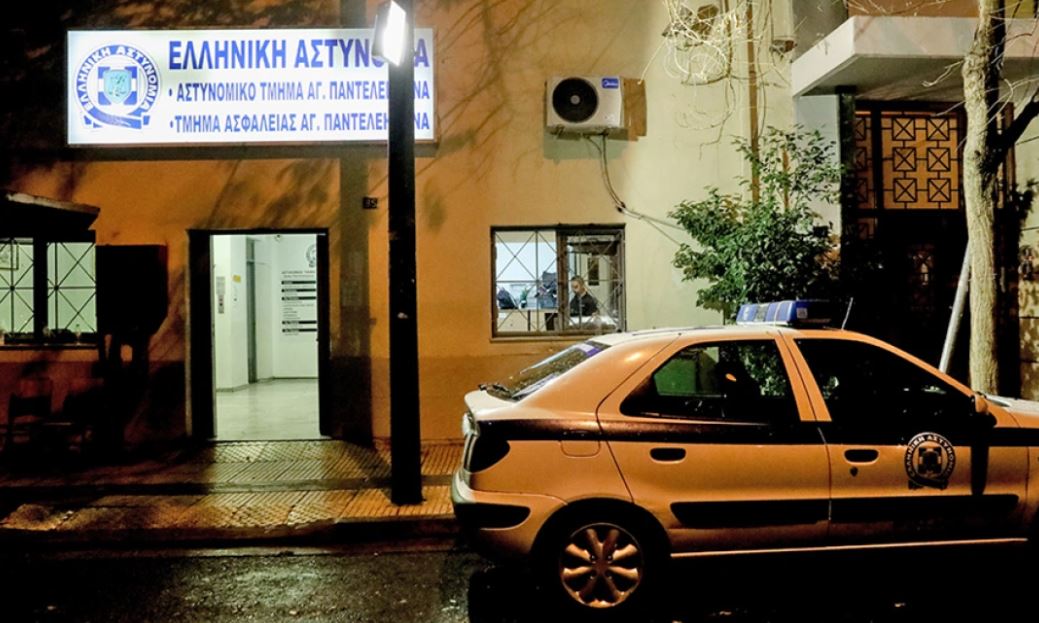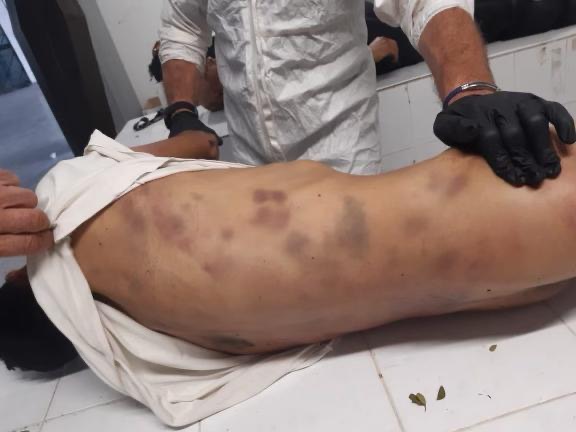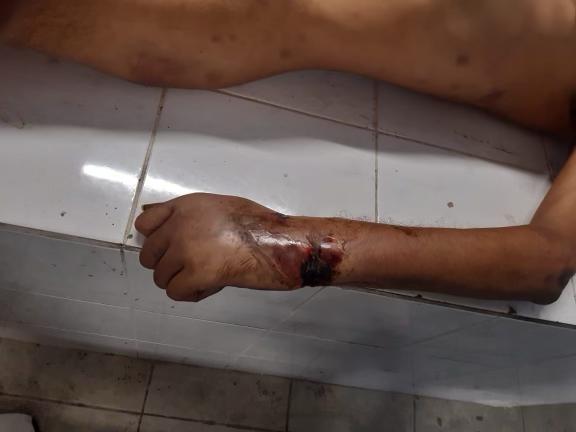
Report by Nektaria Psaraki
Mohammed Kamran Asik was found dead and severely beaten in the temporary detention room of the Agios Panteleimonas Police Station in the early hours of September 21. However, allegations suggest that his ordeal began on September 13, when he was first arrested on domestic violence charges. Since then, he was reportedly transferred between five different police stations in what became a distressing series of events.
According to his family, Asik had been missing since September 13. The last person to see him was his cousin, who noted that he was in perfect health, with no signs of injury. Despite having two mobile phones, Asik was uncontactable, and his family couldn’t locate him. Asik had been living legally in Greece since 2005, working as a delivery man and holding a registered lease in his name. His family searched multiple police stations, but it wasn’t until September 20, after visiting the Nea Ionia Police Station, that they were informed Mohammed was being held at Agios Panteleimonas. The following morning, they learnt he had died.
The Movement Against Racism and the Fascist Threat (KEERFA) held a press conference on September 25 to highlight the case. In a joint statement with the Pakistani Community of Greece “The Unity,” they emphasised, “From September 13 to September 21, when EKAV retrieved his body from Agios Panteleimonas, Mohammed Kamran endured a ‘midnight express’ journey through five police stations, only to end up dead in the last one.” The statement further highlighted that throughout this period, he was denied any contact with his numerous relatives or his lawyer.
Victim’s family lawyer alleges torture in areas without CCTV
Mohammed Kamran Asik was found dead in the temporary detention room of the Agios Panteleimonas Police Station in a horrifying state. His wrists were bloody, deeply bruised, and swollen – likely from handcuffs – and his entire body was covered in bruises. Injuries were also found on his back and legs. Despite these extensive injuries, the police maintain that Asik was already beaten when he was brought to the station on September 18.
Speaking to ThePressProject, the family’s lawyer, Maria Sfetsou, alleged that “Mohammed was tortured in chains” while detained at the Agios Panteleimonas Police Station. She further claimed that this torture took place in parts of the station not covered by CCTV.
CONTENT WARNING


Lawyer challenges police account of detainee’s death, alleges torture in areas without CCTV
The police claimed verbally that Mohammed Kamran Asik arrived at the station already beaten, allegedly due to involvement in a fight, and that he began “beating himself up” once inside the police station. However, his family’s lawyer, Maria Sfetsou, strongly disputes this account. “If you see his wounds, the depth of the injuries on his wrists, and the fact that his entire body was battered, it is clear this was not the result of a fight. Mohammed was tortured in chains,” she asserted.
Police further allege that Asik was violent while in custody, claiming he damaged a sink in the bathroom. However, the lawyer pointed out a disturbing detail: “In the entire police station, there are only two areas without camera surveillance – the bathroom, where he allegedly broke the sink, and the temporary detention room, where he was found dead.”
In their official statement, the police claimed: “The arrested foreigner, while in the bathroom, began to protest strongly in a language the police did not understand, launching an attack and detaching the sink with his hands, after which the attending officers restrained him.” The police also stated that a case file was opened against him for damage to property, disruption of service, insubordination, and refusal to be fingerprinted.
On the morning of September 18, 2024, Asik was brought before the prosecutor, where he was tried and sentenced to 29 months in prison (with four months to be served, and the remaining 25 months suspended for three years), as well as a monetary fine. This narrative, however, stands in stark contrast to the allegations made by the victim’s family and their lawyer, who continue to call for a full investigation into the circumstances surrounding his death.
The lawyer, Maria Sfetsou, commented, “I asked the police to provide footage from his time in detention to verify his condition. They responded that the footage would be deleted within 10 days, as per their protocol, and claimed they didn’t have him in custody for the full period because he was ‘causing a disturbance.’ I have formally requested a copy of all security camera recordings, and now we will see if they comply.”
The police’s claim that Mohammed was transferred to another area due to “incidents with fellow prisoners” was also included in the official statement by the police: “During his stay in the detention cell, a small-scale incident occurred with his fellow inmates, and he was immediately moved to a different area of the Department.”
The timeline of events
The following timeline, as presented by the family’s lawyer, Maria Sfetsou, during a press conference on Thursday, outlines the chain of events leading to Mohammed Kamran Asik’s death:
- September 13: Asik was arrested by police officers at an undisclosed time and location and taken to the Omonia Police Station on charges of domestic violence, detained as part of an automatic procedure.
- September 14: He was brought to the Evelpidon Courts for trial. The case was adjourned until September 16, and his detention was extended. He was then returned to the Omonia Police Station.
- September 16: Asik appeared in court again, and the case was postponed until December, with an order for his release. However, instead of being released as instructed, he was transferred from the Omonia Police Station to the Patision Police Station around 20:25 for an administrative procedure to assess potential grounds for deportation.
- September 16: Due to the lack of detention facilities at the Patision station, he was moved to the Galatsi Police Station.
- September 17: At 18:30, Asik was transferred to the Kolonos Police Station for continued administrative detention.
- September 17 (23:00): He was released from the Kolonos Police Station on orders from an officer at the Patision station, following confirmation that he possessed all the necessary legal documents for his stay in Greece.
- September 18 (00:30): Just an hour and a half after his release, Asik was detained again by the Immediate Action Team and taken to the Agios Panteleimonas Police Station.
- September 18: Inside the Agios Panteleimonas station, he was arrested again, this time for allegedly disrupting the operation of the service, damaging property, and disobeying police orders. The station’s incident book claims he arrived with visible injuries, and emergency services were contacted, a detail also mentioned in the official police statement.
- September 18 (02:10): EKAV arrived at the station, as confirmed by sources in ThePressProject.
- September 18: Asik was brought before the Evelpidon Courts once more for these charges, where he was sentenced to four months in prison. He was then transferred back to the Agios Panteleimonas Police Station.
- September 21: At 7:30 am, Mohammed Kamran Asik was found dead in the temporary detention room of the Agios Panteleimonas station – the only area in the facility without security camera surveillance.
The forensic findings and unanswered questions
The autopsy report indicated that Asiq had suffered multiple beatings, with injuries sustained between four hours to five days before his death. The exact cause of death remains undetermined, but there are suspicions that it may have been caused by an ischaemic episode resulting from extreme stress – similar to the death of Zak Kostopoulos, a Greek LGBTQ+ activist who died in police custody in 2018.
ΕΚΑV confirmed to ThePressProject that their emergency responders found Asiq with head injuries but were not permitted to transport him to the hospital. Sfetsou suggests that the police may have called EKAV merely to create a paper trail indicating Asiq was already injured upon arrival, rather than taking steps to ensure his safety.
The timeline of the arrest according to the police
For the Hellenic Police, the official account of the case begins on September 18. According to their statement, “In the early morning hours of Wednesday, September 18, 2024, the Attica Immediate Action Center received information that a man with facial injuries was violently attempting to enter an apartment building in the Agios Panteleimonas area, where a woman lived, whom he had reportedly followed along the street.”
The ELAS statement further explained: “While the individual was being held at the Police Station, the woman in question arrived but chose not to press charges against him. His personal details were initially recorded verbally, as he did not have identification documents on him. It was later determined that he was a foreign national who had been granted a 30-day deadline for voluntary departure from Greek territory due to his involvement in a prior domestic violence incident.”
Police officers are not executioners
“No matter how serious the crime, the legal system is obligated to ensure the safety and well-being of any detainee – policemen are not executioners,” stated the family lawyer. “In Mohammed’s case, the Court had released him on the domestic violence charge. Instead, he was shuffled from one police station to another under flimsy pretexts, deprived of his rights. He was denied the right to contact anyone, had no phone, went to court without a lawyer, and his family even thought he had been kidnapped. He had none of his personal belongings, not even his keys,” the lawyer explained.
She continued, “The police incident book described him as a homeless, drug addict who did not speak Greek.” It’s worth noting that in their official statement, ELAS referred to him as someone “obviously under the influence of drugs or alcohol.”
“The biggest lie,” Ms. Sfetsou stressed, “is that there is irrefutable evidence proving otherwise. Mohammed had a lease in his name, a permanent residence, and he spoke Greek fluently. He had been living here since 2005, working as a delivery man with successive employers. If they claim he didn’t speak Greek well, I am very curious to see if they provided him with an interpreter during the Autoforos trial, so he could defend himself properly. Regarding the addiction allegations, they repeatedly questioned me about whether he was an addict. I made it clear: despite their assumptions or wishes, he was not. It’s just like what they did with Zak Kostopoulos!”
“Injuries sustained 4 hours to 5 days before death”
According to the victim’s lawyer, the full forensic report from the technical consultant is expected on Saturday. Preliminary findings indicate two distinct categories of injuries based on their age. “The forensic report reveals that the first set of injuries occurred 5 to 6 days before his death, during the period he was held in various police stations. The second set of injuries occurred 4 to 5 hours before his death, specifically while he was at the Agios Panteleimonas Police Station,” the lawyer explained.
The police maintain that they called EKAV because Asiq was “already beaten up” when he arrived at the Agios Panteleimonas station. The police also claimed that “it was established that his injuries did not require transportation to a hospital.”
EKAV: “The duty officer refused to transport him”
Contrary to the police’s claims, EKAV press representative Mr. Damkalis informed ThePressProject that, according to the incident report, “a person was indeed found with head injuries, but despite this, the duty officer at the department refused transportation.”
When asked whether the EKAV responders had seen Mohammed in the condition in which his lifeless body was later found—bearing multiple wounds, bruises, and abrasions—Mr. Damkalis stated that due to personal data protection issues, the service was unable to provide further details.
Lawyer alleges EKAV was called to create a false narrative
Mrs. Sfetsou suggests that the emergency medical services (EKAV) were called as a pre-emptive measure to create witnesses who could claim that Mohammed was already beaten upon his arrival at the police station. She suspects that the most severe injuries were inflicted later.
“They’re trying to cover their tracks,” Sfetsou stated. “On the morning of September 18, hours after EKAV had left, Mohammed appeared before the court. In the state he was in, how could he possibly stand before the judges? The police called EKAV on September 18, right after he was brought in, as a way to establish some kind of backup story—that he arrived at the station already injured. They didn’t anticipate his death and the scrutiny that would follow. By calling EKAV to document his injuries, they avoided transferring him to a hospital so they could continue beating him,” she alleges.
“They were determined to keep him detained”
Ms. Sfetsou argues that Mohammed’s case was racially motivated, highlighting systemic discrimination within the police force. “We can’t ignore the fact that we have racist police departments. It doesn’t take much; being Pakistani was enough for them to feel he deserved to be beaten,” she stated.
“They were determined to keep him detained. Initially, it was for domestic violence. Then, even after he was ordered to be released, he was held under administrative detention on the pretext of checking whether there were grounds for deportation. He was finally released on September 17 at 23:00, only to be rearrested an hour and a half later and taken back to the Agios Panteleimonas station. This back-to-back arrest was recorded without noting the exact place, time, or reason in the incident book, as required. However, because he was Pakistani, he was subjected to a different treatment,” Sfetsou contended.
The prosecutor orders a preliminary investigation
In response to the public outcry, a preliminary investigation has been ordered by the prosecutor to determine the circumstances surrounding Asiq’s death. ELAS claims that statements have been taken, the scene has been examined by the Directorate of Criminal Investigations, and they await a conclusion from the Medical Examiner. A Preliminary Administrative Examination has also been launched within the police force.
However, Sfetsou remains sceptical about the outcome, saying, “If the justice system works, they’ve been caught like mice in a trap. Even if they somehow manage not to connect his death with his injuries, they should be jailed for torture.”
______________________________________________
Are you seeking news from Greece presented from a progressive, non-mainstream perspective? Subscribe monthly or annually to support TPP International in delivering independent reporting in English. Don’t let Greek progressive voices fade.
Make sure to reference “TPP International” and your order number as the reason for payment.